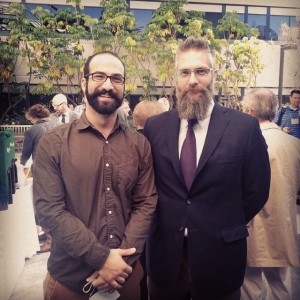
Sadly, Dr. Crisp no longer has this beard. And yet, the aura of its former magnificence still confers authority upon his pronouncements.
Christology can be a tricky business. What does it mean for the Godman to have both a divine and a human nature? Is there a change involved? If so, of what kind? What about Christ’s human nature? Does Christ need a soul and body, or does the Divine Word function as the soul of Christ’s human body? And if he does need one, is it a soul like others, including a human will alongside the divine will of the Word, or is that nonsensical? These are the sort of questions Oliver Crisp sets about examining early in his work Divinity and Humanity: The Incarnation Reconsidered.
As anyone who has spent more than a little time reading theology knows, there are a number of methodological decisions to be made that impact the results we come to or the arguments we find compelling in Christology, and really, any other doctrinal matter. For those looking for a little guidance in these matters, Crisp offers, to my mind, a very sensible rule of thumb:
I think that a good theological rule of thumb is this: if a doctrine contradicts the teaching of Scripture, it is automatically outside orthodox Christian belief. If a doctrine contradicts the implicit teaching of Scripture and the explicit declaration of an ecumenical council — such as the denial of the Trinity — this is also outside orthodox Christian belief. However, if a doctrine is not excluded by Scripture and can find support in the tradition, but contradicts the teaching of an ecumenical council, things are a little trickier. It seems to me that even here, one would have to show that the council in question endorsed some teaching that was itself contrary to Scripture — for what else can trump the authority of an ecumenical council of the Church, except Scripture?
—Divinity and Humanity, pg. 70
With respect to the case he’s speaking of, there might be a number of views of Christ’s human nature that can fit with the Chalcedonian definition, are represented in the tradition, and are not obviously contradictory with Scripture–specifically monothelite views (the view that Christ had a single, divine will.) And yet, if for no other reason than the fact that an ecumenical council endorsed dyotheletism (Christ having both a divine and a human will) as the view most consistent with Scripture, it ought to be preferred. As Crisp says earlier “It seems to me that it is difficult to make sense of the human nature of Christ whichever one opts for, and at least dyothelitism has the advantage of being the view endorsed by an ecumenical council.” (63)
So then, when choosing between two doctrines that can be considered consistent with Scripture, if one has the weight of a council behind it, go with the council. Of course this doesn’t settle all of our theological or methodological questions, but it’s certainly a good place to start. It encourages a theological approach both humble, historical, and churchly in orientation, while still ultimately submitted to the Scripture as God’s Word.
Soli Deo Gloria